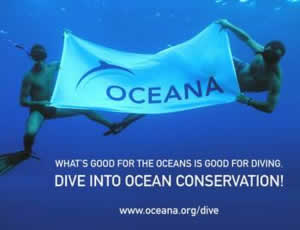
Oceana released the results of a new study today that finds a strong economic incentive for protecting living ocean resources. Sea the Value: Quantifying the Value of Marine Life to Divers shows that scuba divers are willing to pay more to see healthy corals, sharks and sea turtles.
“Divers are personally invested in the oceans and truly understand the importance of safeguarding marine wildlife and habitats,” said Suzanne Garrett, dive program coordinator at Oceana. “Divers are avid participants in ecotourism and show a great willingness to protect all that inhabits the oceans.”

Scuba divers contribute more than $4.1 billion dollars to local coastal economies alone each year through dive-related vacations. As part of Sea the Value, conducted in collaboration with Duke University, scuba divers were asked the maximum amount of money they were willing to pay, in addition to their normal dive costs, for the increased likelihood of seeing a particular species. Information was obtained from more than 500 scuba divers from across the United States who responded to a 25 question, web-based survey.
Average additional amount scuba divers are willing to pay per dive to view wildlife and the total annual value (U.S. $) across all six million dives taken in the United States:
Sea Turtles: $29.63 per dive (annual value: $177.8 million)
Sharks: $35.36 per dive (annual value: $212.2 million)
Healthy Corals: $55.35 per dive (annual value: $332.1 million)
Scuba divers find personal value in seeing healthy marine life when they explore the underwater world. Quantifying this value is important, in part because it provides economic justification for the protection of marine wildlife. In fact, divers are valuable participants in ecotourism and provide economic incentives for coastal areas to protect and preserve the oceans. Many non-coastal cities and states also are home to scuba divers and dive shops that rely heavily on healthy oceans, benefiting from the economic activities of the dive community.
“Divers are great advocates for the oceans because they see first hand what’s happening in the water,” said Elizabeth Griffin, marine wildlife scientist at Oceana. “Failure of ocean managers to decrease pressures from commercial fishing, pollution and climate change continues to threaten the health and future of the world’s oceans.”
When asked whether the U.S. government sufficiently protects its dive sites, most divers said no. Scuba divers saw pollution as the most damaging threat to ocean health, followed by unsustainable fishing, loss of habitat, loss of biodiversity and, finally, climate change. These are all areas where divers feel the U.S. should improve ocean conservation and management to help better protect marine habitats.
For more information on what you can do to help and to view a full copy of the report, please visit http://oceana.org/dive.











